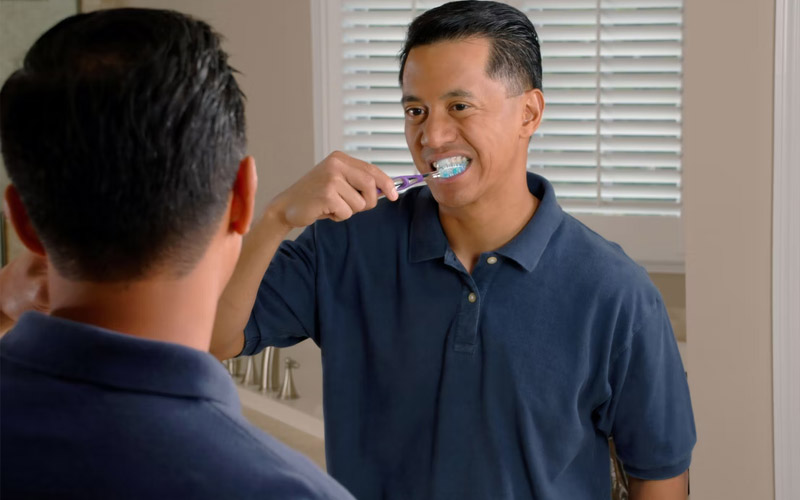Brushing Your Teeth After Eating

Oral hygiene is an essential aspect of personal care, and one of the most fundamental practices is brushing our teeth. We've all been taught to brush our teeth at least twice a day, but have you ever wondered if there's an optimal time to brush your teeth, particularly after eating? The answer is not as straightforward as you might think, and it involves a delicate balance between maintaining good oral health and understanding the potential risks associated with certain practices.
The Importance of Oral Hygiene

Our oral health is a window to our overall well-being. Poor oral hygiene can lead to a myriad of issues, including tooth decay, gum disease, bad breath, and even more serious health complications. Brushing our teeth is a crucial step in removing plaque, a sticky film of bacteria that constantly forms on our teeth. If left unchecked, plaque can harden into tartar, which can only be removed by a dental professional.
Brushing helps to disrupt this bacterial buildup, preventing the formation of cavities and gum inflammation. It's recommended to brush for at least two minutes, covering all surfaces of the teeth and the tongue, which can also harbor bacteria.
When is the Best Time to Brush Your Teeth After Eating?

The timing of brushing your teeth after eating is a subject of some debate and scientific inquiry. While it might seem logical to brush immediately after a meal to remove any food particles and neutralize acids produced by bacteria, there are some considerations to keep in mind.
Acidic Foods and Drinks
Many of the foods and beverages we consume are acidic in nature. Common culprits include citrus fruits, tomatoes, vinegar-based dressings, and carbonated drinks. These acids can temporarily soften the enamel, the protective outer layer of our teeth. Brushing immediately after consuming acidic foods or drinks can actually accelerate enamel erosion, as the softened enamel is more susceptible to abrasion.
To illustrate, consider the pH scale, which measures acidity. Our saliva typically has a neutral pH of around 7. However, many of the foods we eat can push this pH to much lower levels. For example, orange juice can have a pH as low as 3.5, making it highly acidic. After consuming such foods, it's best to wait for about 30 minutes to an hour before brushing to allow the saliva to neutralize the acid and re-harden the enamel.
| Food/Drink | pH Level |
|---|---|
| Lemon | 2.0 - 2.6 |
| Orange | 3.0 - 4.0 |
| Apple | 3.0 - 4.0 |
| Cola | 2.5 - 3.5 |
| Saliva | 6.5 - 7.5 |

The Role of Saliva
Saliva is our body’s natural defense mechanism against acid erosion. It helps to neutralize acids and contains minerals like calcium and phosphate that can help remineralize and strengthen tooth enamel. By waiting a short period after eating, you allow saliva to do its job, creating a more favorable environment for brushing without causing undue harm to your enamel.
Brushing Techniques
The technique you use when brushing is just as important as the timing. A gentle, circular motion is recommended to avoid damaging the gums or enamel. Electric toothbrushes can be particularly effective, as they often have built-in timers and can help ensure you’re brushing for the full two minutes. Additionally, using a soft-bristled toothbrush is crucial to prevent unnecessary abrasion.
Considerations for Specific Diets
The timing of brushing can vary depending on your dietary habits. For instance, individuals following a keto diet, which is high in fat and protein, might experience bad breath due to the production of ketones. In such cases, brushing immediately after a meal can help freshen the breath and remove any residual food particles. However, it’s still important to be mindful of acidic foods and wait if necessary.
Frequently Asked Questions (FAQ)
Is it harmful to brush immediately after drinking coffee or tea?
+Coffee and tea, especially when consumed with sugar or cream, can create an acidic environment in the mouth. It’s generally advised to wait a bit before brushing to avoid potential enamel erosion. However, if you’re concerned about stains, you can rinse your mouth with water first to dilute the pigments and then proceed with brushing.
What if I can’t wait the recommended time after eating acidic foods?
+In such cases, it’s recommended to at least rinse your mouth with water or a fluoride mouthwash. This can help dilute the acids and provide some protection to your enamel. However, for optimal oral health, it’s best to wait the full recommended time before brushing.
Can I brush my teeth right after eating sugary snacks?
+While it might be tempting to brush away sugary residue immediately, it’s best to wait. Sugary foods can create an acidic environment, and brushing too soon can harm your enamel. Instead, try chewing sugar-free gum to stimulate saliva production, which can help neutralize acids and protect your teeth.



